Book Reviews on All Quiet on the Western Front
/https://tf-cmsv2-smithsonianmag-media.s3.amazonaws.com/filer/00/a8/00a8b7b9-2241-4a69-b7e9-62d5735814e1/42-55068840.jpg)
On December 5, 1930, just over 12 years later the finish of Earth State of war I, German moviegoers flocked to Berlin's Mozart Hall to encounter one of Hollywood'due south latest films. But during the movie, a cadre of 150 Nazi Brownshirts, nearly all too young to take fought in Globe State of war I, were led into the theater by propagandist Joseph Goebbels. Spewing anti-Semitic invective at the screen, they repeatedly shouted "Judenfilm!" equally they tossed stink bombs from the balcony, threw sneezing powder in the air, and released white mice into the theater. A somewhat shocking turn of events, considering the motion picture was the highly anticipated adaptation of countryman Erich Maria Remarque'south novel All Quiet on the Western Front, the blockbuster novel that had transfixed the nation months earlier.
Outset serialized in 1928 in the German newspaper Vossische Zeitung he, the volume was published on January 31, 1929, and instantly became a literary juggernaut. In Germany, the initial print run sold out on release day, and some 20,000 copies moved off the shelves in the commencement few weeks on its way to more a million books sold by year's terminate. Abroad, All Quiet on the Western Front was a big hitting too, selling 600,000 copies in both Great britain and France, and 200,000 in America. The flick rights were snatched up by Universal Pictures for a record $xl,000 and the move flick went into production immediately.
All Serenity on the Western Front is, as most American high school students know, the story of a company of volunteer German soldiers stationed behind the front lines in the final weeks of Earth War I. Based on Remarque'due south fourth dimension as an infantryman, it's the offset-person account of Paul Baumer, who joins the cause with a group of his classmates.
It's a gritty pull-no-punches look at the horrors of state of war. Limbs are lost, horses are destroyed, starving soldiers root through garbage for food, the troops are ravaged by poison gas and arms bombs, and few make information technology out live. Baumer himself dies on a tranquil 24-hour interval soon before the Armistice is signed. Apolitical in terms of policy and strategy, Remarque'due south anti-war masterpiece tapped into the global sorrow following a conflict that led to more than than 37 million casualties between 1914-18. The humanity of All Quiet on the Western Front end was captured in The New York Times review as, "a document of men who—all the same else at that place lives were disrupted—could suffer war simply equally war."
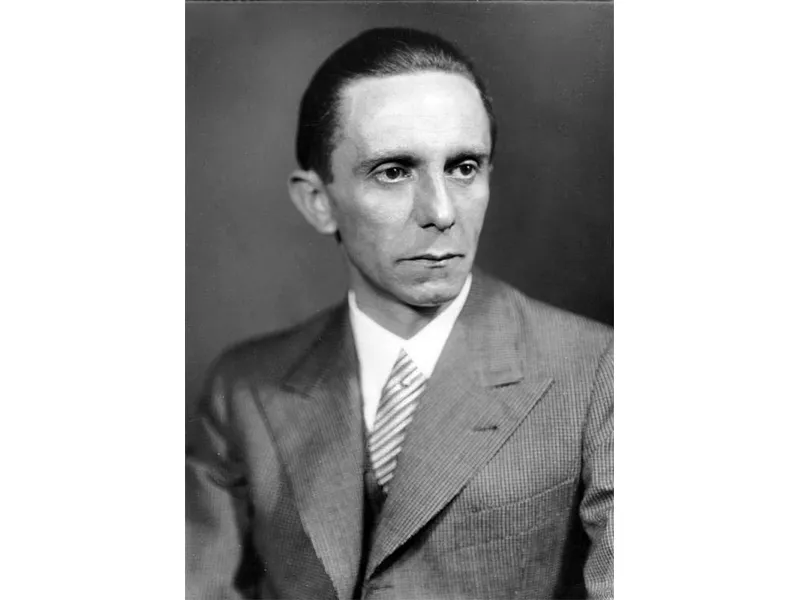
Ironically it was this very humanity, and relentless political agnosticism, that made Goebbels see the All Quiet on the Western Front film as a threat to the Nazi ideology. A few weeks prior to the December screening, the National Socialist German Workers' Party surprised the nation on election day, garnering 6.iv million votes, 18 per centum of the total. Information technology was a stunning victory for Adolf Hitler that gave his political party 107 seats in the Reichstag and made the Nazis the second-largest party in Germany. His leading campaign message, to unite Federal republic of germany and make information technology potent once more, resonated with voters in the midst of the Great Depression. Hitler, believing that treasonous Jewish-Marxist revolutionaries at home were to blame for Germany'due south defeat in the Great War, proposed tearing upward the Treaty of Versailles and ending state of war reparations to the Allies. This "stabbed in the back" theory was historical nonsense, but allowed workaday Germans to place arraign elsewhere for the conflict that took an estimated three 1000000 lives, war machine and civilian, an easy sell that undermined the Weimar Republic.
All Quiet on the Western Forepart may have been the first runaway international bestseller, only its utter lack of pro-High german propaganda and honest, downbeat look at war fabricated the book a Nazi target. Every bit Hitler's power grew, Remarque's critically acclaimed novel (which would be nominated for the Nobel Peace Prize in 1931) became a proxy for Nazi rage over its portrayal of German infantrymen as dispirited and disillusioned. Hitler refused to believe Teutonic soldiers could be anything but a magnificent fighting force, a nationalistic historical rewrite that took agree amid the battered German citizenry.
"Ane of the groovy legacies of Earth War I is that every bit soon as the Armistice is signed, the enemy is war itself, not the Germans, Russians, or French. The book captures it and becomes the definitive anti-war argument of the Swell State of war," says Dr. Thomas Doherty, professor of American Studies at Brandeis and the author of Hollywood and Hitler, 1933-39. "The picture has the same depressing tone, the hero doesn't achieve battleground glory. He dies in the famous scene reaching for the butterfly. It's an extraordinary film, the beginning must-see of the early sound era not starring Al Jolson. Unfortunately, the premiere was an animating moment in the history of Nazism, reclaiming the World War I retentiveness not equally meaningless slaughter, equally Remarque says, but as a glorious noble German enterprise."
The $1.25-million film had really quietly debuted in Deutschland on Dec four under heavy police presence. According to a Diversity reporter, when then lights came up, the audience was also rattled or moved to disapprove or applaud. Notwithstanding, Goebbels correctly guessed that the theater would let its guard downward during the December 5 showing. His surprise mob attack went far beyond the realm of boyhood fraternity pranks like mice and sneezing pulverisation. The projectors were shut down and in the anarchy, savage beatings were handed downwards to moviegoers believed to exist Jewish. (Also in omnipresence: Future Nazi filmmaker—and occasional drinking buddy/confidant of Remarque—Leni Riefenstahl.)
Goebbels, a tiny man with a clubfoot, had been unfit to fight in World War I and his physical rejection consumed him. His hatred of All Quiet on the Western Front was both a personal vendetta and one of the first major public displays of Nazi thuggery. The principal goal was simply to create chaos, to terrorize moviegoers, to rally support confronting the film. "Within ten minutes, the movie theatre was a madhouse," Goebbels gloated in his diary that night. "The police are powerless. The embittered masses are violently against the Jews."
Goebbels would atomic number 82 torch-wielding hooligans for the next few days as other riots bankrupt out. In Vienna, 1,500 police surrounded the Apollo Theater and withstood a mob of several grand Nazis trying to disrupt the movie, but vandalism and violence nevertheless erupted in the streets. Other disturbances, like one on December ix in Berlin's Due west Stop district were more than sanguine. The New York Times described it as "fairly polite rioting, the sort i could take one's best girl to see." Simply scary in that information technology proved others were heeding the Nazi call.
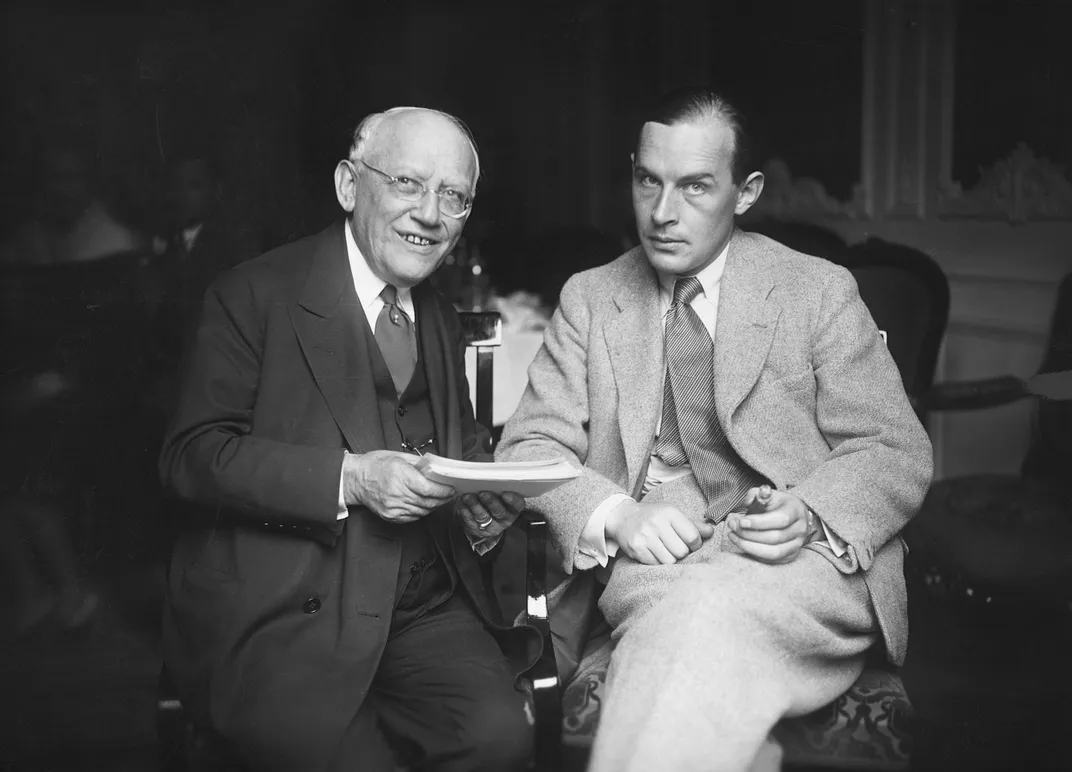
By week's cease, the Supreme Board of Censors in Federal republic of germany had reversed its original decision and banned All Quiet on the Western Forepart, even though Universal Pictures had already revised the film, sanitizing the trench warfare scenes and removing dialogue blaming the Kaiser for the war. Universal founder Carl Laemmle, a Jewish emigre from Germany, was shocked at the motion picture's controversial reception. He sent a cable to Berlin newspapers, which ran equally an ad, basically saying that the picture was non anti-High german and that it portrayed a universal war feel. (His signal was fabricated in Poland, where All Quiet on the Western Front was banned for existence pro-German.) Laemmle's efforts were fruitless, the Nazi intimidation tactics worked. Perhaps the near insidious part of the damage done was emboldening the Brownshirts to go after people where they live. As Doherty eloquently puts it in his book:
"Whether in the cathedral-like expanse of a grand motility movie theatre or a cozy seat at the neighborhood Bijou, the film theater was a privileged zone of safety and fantasy—a place to escape, to dream, to float free from the worries of the world across the Art Deco lobby, a world that, in the first cold wintertime of the Great Low, was harder and harder to go on at bay. All the more reason to view the Nazi-instigated violence as the desecration of a sacred space."
Throughout, Remarque stayed relatively quiet, a habit he would later on come to regret. He'd been recruited by Laemmle to write the screenplay, and every bit the legend goes, to play Baumer, but neither came to fruition. In his biography The Last Romantic, author Hilton Tims says Remarque was visited by a Nazi emissary prior to the premiere, who asked him to confirm that the publishers had sold the film rights without his consent. The idea was he'd been swindled past Jews, which Goebbels could use as propaganda, in commutation for protection from the Nazis. Remarque declined.
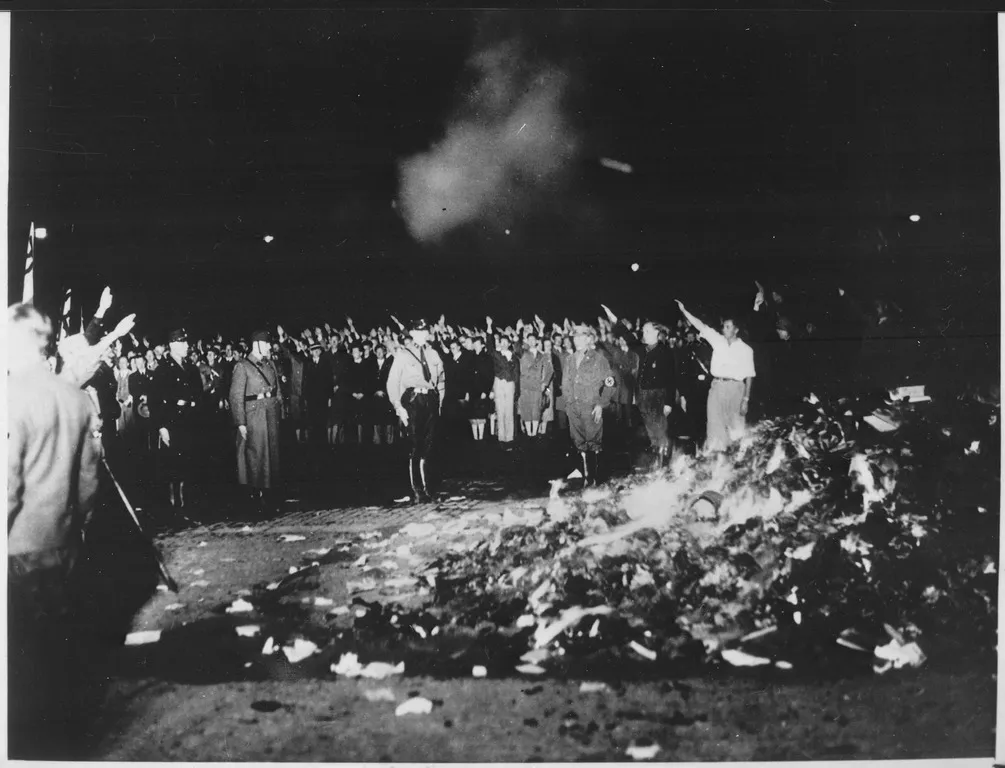
On the dark of May 10, 1933, four months after the Nazis had come to power in Germany, Nazis raided bookstores and libraries, stampeding by torchlight to ritually hurl the books of more than 150 authors on to flaming pyres of gas-soaked logs. Students screamed into the night, condemning each writer as some 25,000 books were incinerated. Goebbels would call it "the cleansing of the German spirit."
Remarque, neither Communist nor Jew, had been in Berlin on Jan 31, 1933, the 24-hour interval Hitler was appointed chancellor. He was tipped off that the Nazis were gunning for him and drove through the darkness to escape. On that May evening, Remarque was ensconced in his palatial Swiss home. By year's end, the Nazis would made it a crime to own All Tranquility on the Western Front end or its sequel-of-a-sort,The Route Back. All private copies had to be turned over to the Gestapo.
Remarque would stop his trilogy with 3 Comrades, the tale of three German soldiers who open up an auto body shop and all fall for the same dying woman. Like The Road Back, it sold well and was adjusted into a milquetoast film, albeit it the only moving-picture show with F. Scott Fitzgerald credited equally a screenwriter. Concerned almost his safety in Switzerland, Remarque sailed to America in 1939, where he would be reunited with one of his many paramours, an actress he'd met in the South of France, Marlene Dietrich. Although married, for the second time, to the dancer and actress Jutta Ilse Zambona, Remarque would have countless diplomacy. From barmaids and prostitutes to Hollywood royalty like Greta Garbo, Hedy Lamarr, Luise Rainer and Maureen O'Sullivan (long rumored to have aborted his but child), Remarque had an insatiable sexual appetite.
As World War II raged on, Remarque lived the high life unbeknownst of his family unit's tragic suffering. His blood brother-in-law became a prisoner-of-war; his father's second married woman committed suicide, but information technology was what befell his youngest sister that haunted Remarque for the remainder of his life. In September 1943, Elfriede, a fashionista dressmaker living in Dresden, was turned in by her landlady and arrested by the Gestapo for "defeatist talk" and "subversion of war machine force." She was sentenced to decease in a sham trial 'every bit a dishonorable subversive propagandist for our enemies'. On December 12, Elfriede was beheaded past guillotine.
Records of the judge'southward summation at trial were destroyed in an air raid during Elfriede's incarceration. Co-ordinate to Tims, in pronouncing the conclusion the guess allegedly stated: 'We have sentenced you to death because we cannot apprehend your blood brother. You must endure for your blood brother.' Remarque would dedicate his 1952 novel Spark of Life to Elfriede, just in a final twist of the pocketknife, it was omitted in the German version, a snub chalked up to those who still saw him equally a traitor.
Equally for the book and film that started his career and ended his relationship with his native land, they went on to be stunning successes. An estimated xxx to 40-one thousand thousand copies of All Quiet on the Western Front have been sold since information technology was offset published in 1929, and the film would win that year'south University Awards for Best Director and Best Production. It is still regarded as ane of the best state of war movies ever made.
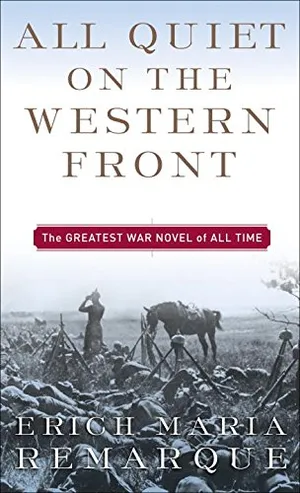
All Tranquility on the Western Forepart
allshousetherencough.blogspot.com
Source: https://www.smithsonianmag.com/history/most-loved-and-hated-novel-about-world-war-I-180955540/
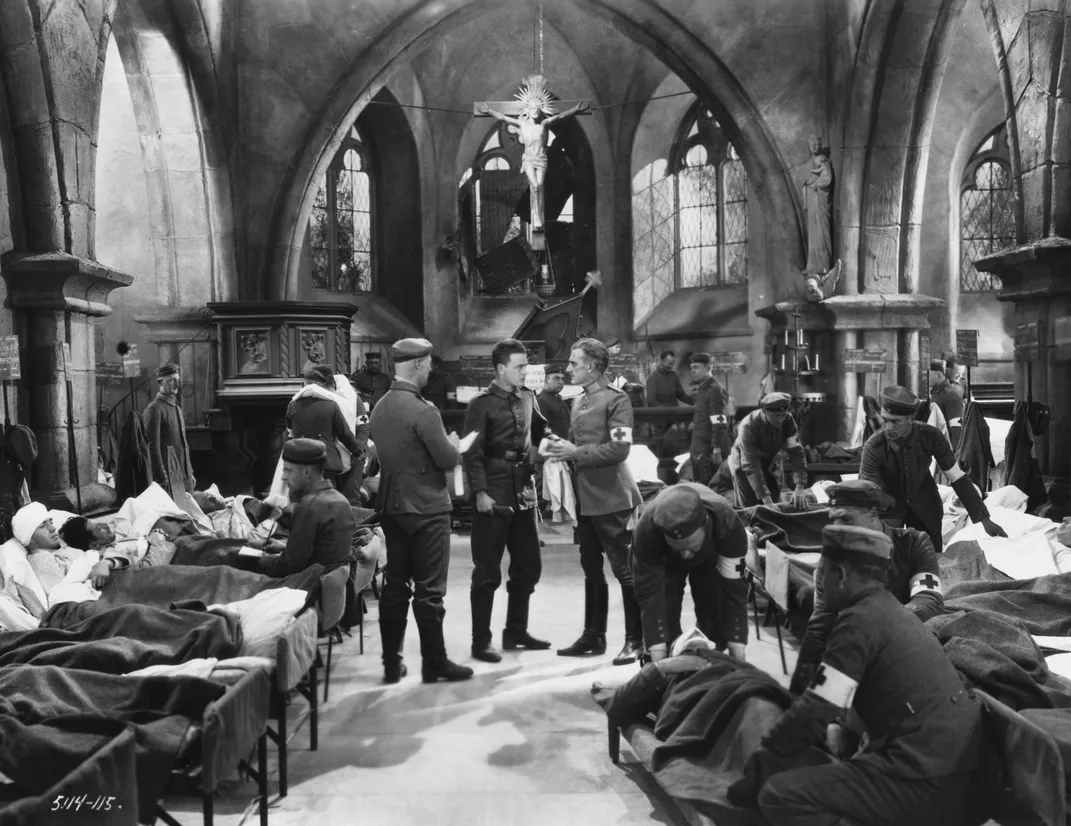
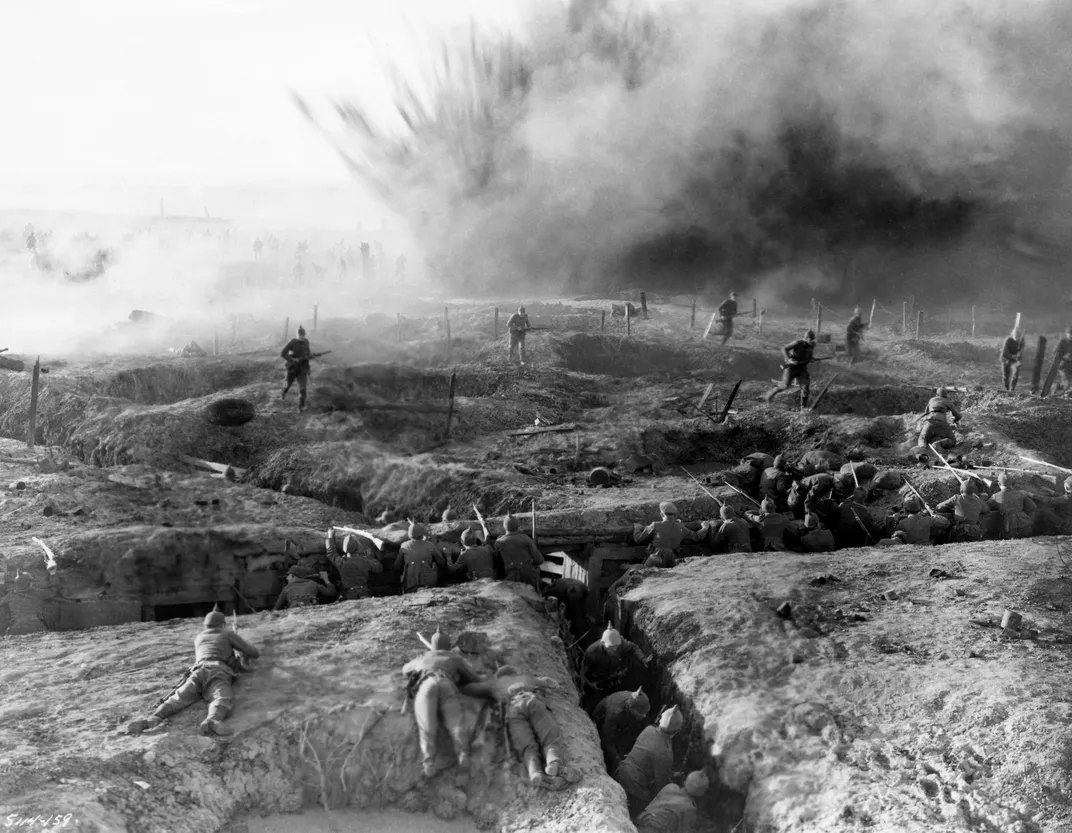
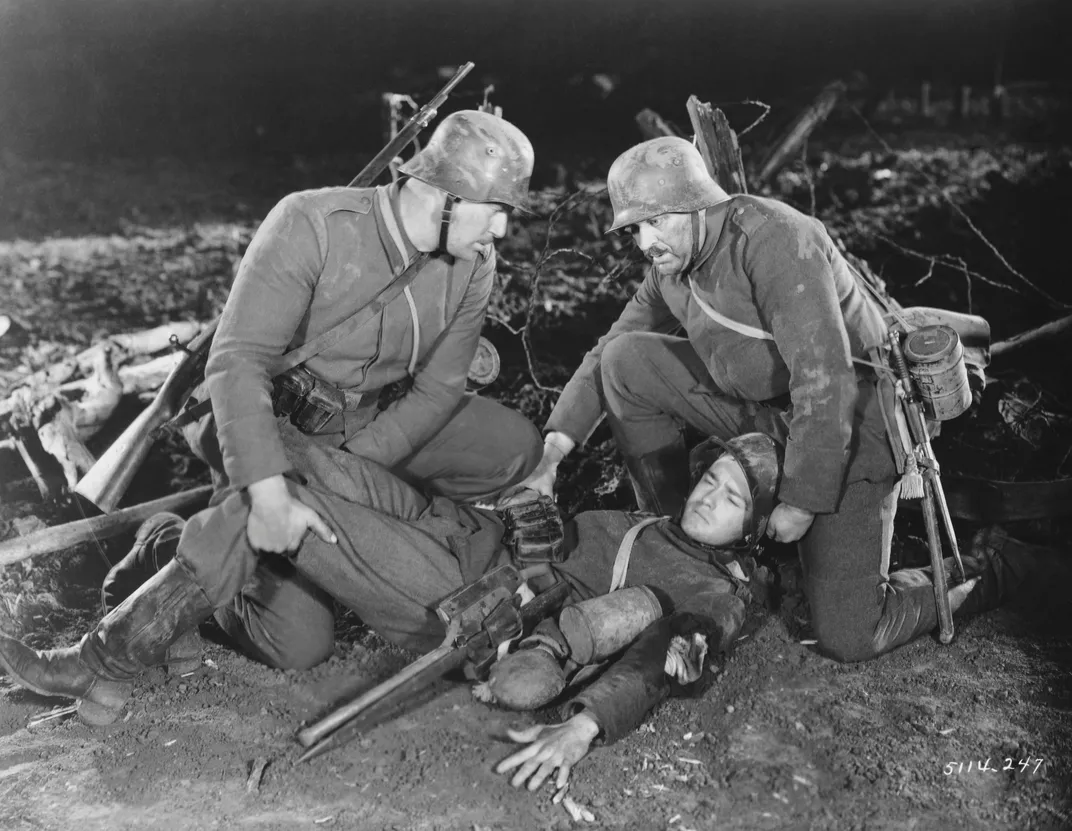
0 Response to "Book Reviews on All Quiet on the Western Front"
Post a Comment